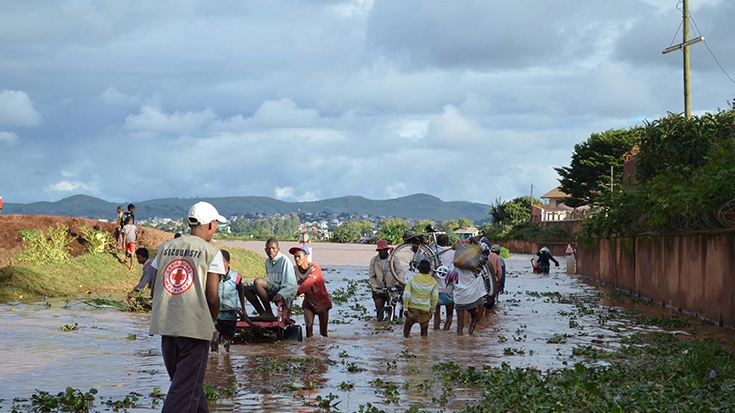ANTANANARIVO, June 24, 2015 — The office of the World Bank in Madagascar has released its Economic Update for the second quarter of 2015. The new report reveals a slow economic recovery that is reflected in the decline of new business creation, job creation, and consumption of petroleum products. Catastrophic meteorological conditions have also taken a toll on the economy, resulting in higher inflation and a reduction of household purchasing power.
Despite expectations, a strong economic rebound did not materialize in the first quarter of 2015. This was observed in the performance of several indicators, including the pace of new business creation (3,289 new firms registered), which was down by 30% compared to the same period in 2014. Moreover, there was no corresponding increase in job creation, based on the number of workers registered with the private sector pension scheme (CNaPs), which also remained flat. The volume of petroleum product consumption declined, especially that of jet fuel, which is a barometer for activities in the tourism sector.
Another drag on the economy, and one with a heavy human toll, was the impact of two tropical storms: Chedza and Fundi. Heavy rains destroyed farm areas, infrastructure and houses – the long term costs of which are still being estimated. The immediate impact of the damages to agricultural products was higher inflation, which reached 7.9% in March following a stable rate of 6% over the course of the previous year and a half. The rise in inflation was detrimental to the purchasing power of households, especially poor households, who spend disproportionately more of their income on food. Reduced purchasing power has had cascading effects on other activities, triggering the breaks on economic recovery.
The Central Bank of Madagascar maintained prudent monetary policies during the first quarter of 2015. The ariary, Madagascar’s local currency, depreciated strongly in March against the US dollar, after being stable since mid-December 2014. Against the euro, the ariary had been on an appreciation trend since the beginning of December 2014, which reflected the depreciation of the euro against US dollar. The trend turned in early March, however, and the ariary depreciated strongly against the euro as well. Part of the explanation for these relatively large movements is that the currency market is thin, and it can be influenced greatly by the activities of a few participants. The Central Bank intervened in the currency market to help smooth volatility, preserving the international reserves at a level slightly higher than the previous quarter.
The report also revealed some positive trends in the first quarter 2015. Compared to the same period in 2014, tax revenue increased by 20% in the first quarter. Madagascar’s trade deficit narrowed and the import value decreased by 17% in the first quarter of 2015 compared to the same period in 2014, due to the decline in international energy prices and a reduction in rice imports. The export value increased by 12%, thanks to the volume of nickel and cobalt exports which offset lower prices and more favorable prices and production of cloves and vanilla. The performance of these products more than compensated for the decline in export values of shrimps, tuna and textile, the mainstay of the free zone (Zone franche).
Despite the slow start, it is still possible for the economy to rebound in the remainder of 2015. The National Development Plan (PND) and its implementing plan foresee numerous investments which could jump start the economy, provided that financing can be identified from the private sector and foreign partners. To attain the goals laid out in the PND, strong signals are needed from the government to demonstrate its commitment to carrying out urgent reforms.
This report also presents the results from the 7th and latest round of the «Listening to Madagascar» surveys, whose theme was quality of life and the evolution of household well-being. These innovative mobile telephone surveys are conducted jointly by the National Statistics Institute (INSTAT) and the World Bank. The previous rounds of surveys were on financial inclusion, education, tax and governance, electricity and transportation, health, water and sanitation, and nutrition and food security. According to the 7th round of surveys, the majority of households judge that they are unhappy with their life and that their income is too low to cover household needs. Almost half of households think that their well-being declined compared to 2008, mainly because of the increase in the cost of living.
